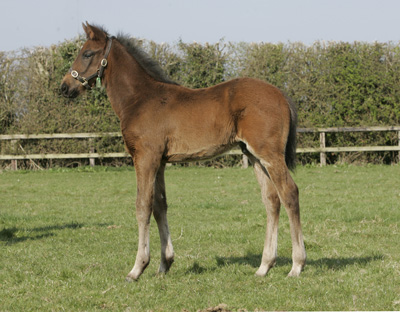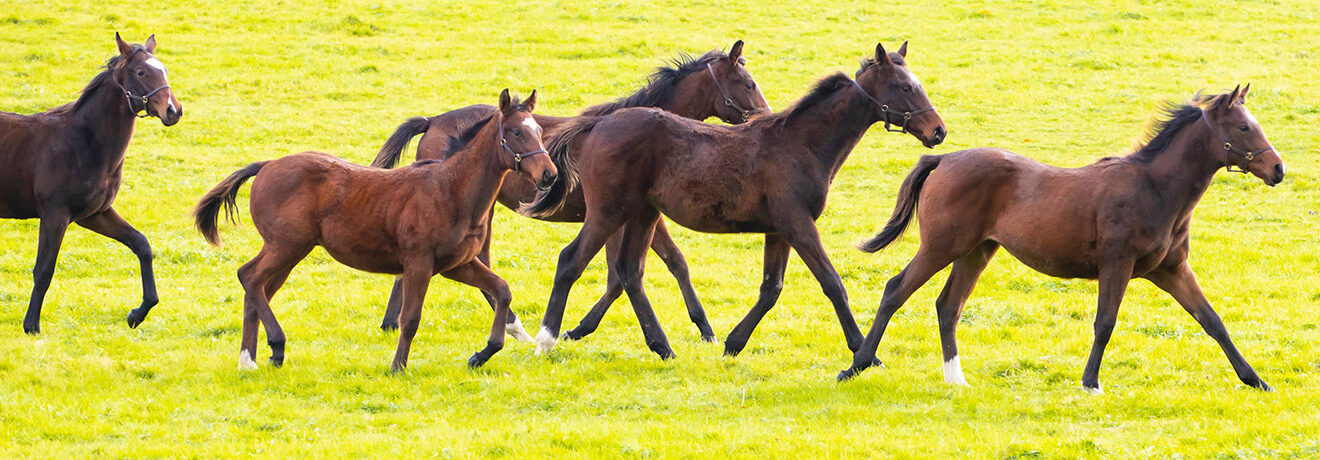The first six months of a foal’s life is where the young growing horse achieves approx. 86% of its mature height and 46% of its mature weight.
Growth in these early stages results in the laying down of new tissues that result in bone, tendon, ligament, muscle etc. The foal’s diet needs to supply sufficient nutrients to meet this growth. A young suckling foal will meet its requirements providing the mare is well nourished.
Some foals may need additional feed as milk production diminishes (typically after 3 months of lactation).
- Gradually introduce the foal to concentrate
- Creep feed separately from mare to control intake
- Feed specific products which require a low feed intake – high concentration of protein, vitamins and minerals
- GAIN Foal Pellets contain milk based proteins which are both high in quality and easy for the developing foal to digest
As the foal develops, forage will become an increasing part of its diet. It is vital to assess the total ration of growing bloodstock. This must include analysis of the forage, in particular the mineral levels supplied. Variations in pasture mineral levels are well known, and pasture analysis over the years are showing lower mineral levels with common mineral interactions.
Energy, protein and amino acid intake have a significant impact on the growth and development of growing horses. A source of good quality protein is essential to ensure proper bone and muscle formation.

Avoid youngstock becoming overweight.
This is an indicator of oversupply of energy and will put excessive weight on the developing growth plates.
Feeding higher calorie stud diets may be appropriate in winter, but in summer, the feed is often cut right back, often to nothing at all. If a normal stud ration has been formulated to feed at the rate of 3kgs per day, and the feeder reduces this to 1kg per day for the overtopped youngstock, then the horse will only receive one third of the required minerals, vitamins and quality protein.
The pasture cannot be relied on to provide all the minerals to support quality growth.
If higher calorie stud diets are required for smaller or slow growing individuals then they should be fed little and often to prevent large surges in insulin response.
Stud Care 32 Balancer has been produced by GAIN Equine Nutrition to feed to overtopped youngstock; this is a low energy, low starch feed for breeding stock. It has been formulated to be fed with good quality forage, pasture and/or hay or haylage.
GAIN Stud Care 32 Balancer’s small pellets will supply the vital minerals in a highly available form, plus quality amino acids and vitamins, without an oversupply of energy. GAIN Stud Care 32 Balancer is therefore ideal to be fed to youngstock at grass in the summer, maintaining the necessary intake of minerals by feeding a given amount daily.
Promote a moderate steady growth rate, particularly avoiding periods of low growth followed by periods of rapid growth (commonly referred to a ‘compensatory growth’)
- Diets should contain adequate but not excess energy
- Calcium and phosphorus ratios should be maintained ideally Ca: P 2:1
- Maintain adequate intakes of minerals including calcium, phosphorus, magnesium, copper, zinc, manganese etc.
- Provide an opportunity for sufficient but not excessive exercise
- As there is a genetic link to ‘Developmental Skeletal Problems’ avoid breeding mares to stallions that have produced a number of foals with DSP (this information is not available across all breeds)
- Studies have shown a link between the glyceamic index of the diet and the onset of OCD in particular
- Consult with your farrier, vet and a feed nutritionist if you have concerns over DOD in your foal/weanling
If the clinical signs of DOD become evident, energy intake should be reduced, but, minerals, quality protein and vitamins must be maintained.
Starvation of the young horse may lead to further problems and is not recommended. Where clinical signs of DOD are evident, exercise should be restricted to walking in hand until heat and lameness disappear. Make changes to the diet as appropriate and if in doubt contact your vet and/or nutritionist.

Joanne Hurley is a nutrition specialist with GAIN Equine Nutrition. She holds a Masters in Animal Nutrition and Production from UCD. Joanne can be contacted by email at jhurley@tirlan.ie

